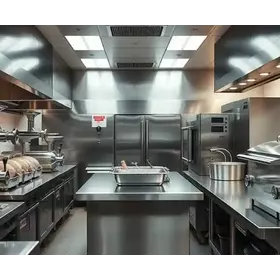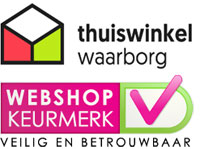How Smart Kitchens Are Shaping the Future of Hospitality
What is a smart kitchen and why are hospitality businesses investing in them?
Technology is rapidly reshaping the hospitality industry, and smart kitchens are at the center of this transformation. With growing demands for efficiency, consistency, sustainability, and profitability, hotels, restaurants, and catering companies are turning to intelligent kitchen solutions to stay competitive in 2025 and beyond.
But what exactly is a smart kitchen, and how is it changing food service operations across Europe? Let’s explore.
Looking to bring smart technology into your kitchen? Check out our smart kitchen equipment or contact us for advice.
What is a smart kitchen?
A smart kitchen is a technology-enhanced culinary environment that uses IoT (Internet of Things) devices, AI-powered tools, and automation to streamline workflows, improve safety, and cut costs. These systems collect and analyze real-time data to assist chefs and operators in everything from cooking precision to energy management.
Smart kitchen appliances go beyond traditional functionality. They learn, adapt, and communicate, offering features like voice control, automated temperature adjustments, real-time alerts, and predictive maintenance.
Why Hospitality Businesses Are Embracing Smart Kitchens
1. Boosting efficiency in commercial kitchens
In high-pressure environments like restaurants and hotel buffets, efficiency is everything. Smart appliances automate repetitive tasks, reduce errors, and optimize food preparation. For example:
- Smart ovens adjust heat automatically for perfect results every time.
- Robotic fryers and blenders handle large volumes with consistent output.
- Voice-activated commands allow chefs to operate devices hands-free.
These innovations free up staff to focus on service, creativity, and quality, improving both the back-of-house workflow and the guest experience.
2. Improving food safety and quality
Food safety compliance is easier and more reliable with connected technology. Automated temperature monitoring ensures perishables stay within safe limits, while smart thermometers send real-time updates to mobile devices.
Many smart appliances also support HACCP compliance by automatically logging data like cooking temperatures and refrigeration conditions. This not only enhances food safety but also helps maintain consistent food quality across shifts and locations.
3. Saving energy and reducing waste
Smart kitchen equipment is designed with sustainability in mind. IoT-connected refrigerators, ovens, and dishwashers adapt to off-peak hours, adjust power output based on demand, and reduce overall consumption.
Studies show that smart kitchens can reduce energy use by up to 25% and cut operational downtime by 15%. Features like predictive maintenance help prevent breakdowns and reduce food and energy waste, two major cost drivers in hospitality.
Want to cut energy costs and boost efficiency? Explore smart solutions designed for hospitality kitchens.
4. Data-driven decision making
Modern smart kitchens collect valuable data that can shape daily operations and long-term strategies. From cooking times and energy usage to equipment maintenance and inventory turnover, the insights are powerful:
- AI systems can recommend recipe adjustments.
- Smart inventory tools predict restocking needs based on usage.
- Managers can analyze cooking trends and performance to reduce bottlenecks.
This level of real-time visibility and automation empowers operators to make smarter, faster decisions.
5. Enhancing the guest experience
Smart kitchen technology helps elevate the customer journey by increasing speed, accuracy, and personalization:
- Meals are served faster thanks to automated prep and cooking.
- Appliances like smart coffee makers allow for customized drink options.
- Guests receive consistently high-quality meals, whether it’s a five-star dinner or room service breakfast.
Restaurants and hotels that showcase their smart kitchen capabilities on social media often see increased engagement and bookings. In fact, video content featuring behind-the-scenes kitchen tech consistently outperforms static posts in reach and interaction.
How restaurants and hotels are using smart kitchens
Hotels are using smart ovens and connected refrigeration to improve room service reliability and buffet prep efficiency. Upscale establishments incorporate smart gadgets like air fryers and sous vide systems to elevate in-room dining and common-area offerings.
Restaurants, especially multi-location chains, rely on smart appliances to standardize cooking times, manage inventory, and train staff more easily. Whether it’s a compact smart slow cooker or a fully connected line of commercial equipment, these technologies support scalable, high-performance operations.
Not sure where to start? Our team can help you find scalable, budget-friendly smart kitchen solutions. Let’s talk.
Challenges in adopting smart kitchen technology
While the benefits are clear, smart kitchen adoption comes with challenges:
- Higher upfront costs (30–50% more than traditional appliances)
- Training requirements for staff unfamiliar with new tech
- Integration issues with existing systems or older infrastructure
To overcome these, businesses are advised to:
- Start with scalable equipment that delivers measurable ROI
- Choose compatible devices from trusted manufacturers
- Offer onboarding and training to ensure smooth adoption
Future trends in smart kitchens
As technology continues to evolve, here’s what the future holds for hospitality kitchens:
- Voice-first controls: Full hands-free kitchen management
- AI-powered recipe creation: Systems that adapt menus based on trends and inventory
- Sustainable design: Eco-friendly materials and ultra-efficient systems
- Hyper-personalization: Dishes tailored to guest preferences using AI data
- AR training tools: Augmented reality instructions for onboarding and cooking
- Smart home integration: Kitchens synced with broader hotel or restaurant systems
By 2030, more than half of commercial kitchens are expected to incorporate AI or IoT solutions, making now the perfect time to prepare for that shift.
How to choose the right smart kitchen equipment
When investing in smart kitchen tech, consider the following:
- Your goals: Are you looking to save energy, boost productivity, or improve consistency?
- Space limitations: Choose compact, multi-function appliances where space is tight.
- Integration: Select tools that work with your current infrastructure and POS systems.
- Ease of use: Devices with intuitive interfaces and mobile apps ensure smoother adoption.
- Energy savings: Focus on energy-efficient models that cut operational costs.
- Reliable brands: Stick with trusted names like Rational, Panasonic, or Menumaster.
Conclusion: Smart kitchens are the future of hospitality
The smart kitchen revolution is not a passing trend, it’s a long-term shift reshaping how hospitality businesses operate. By investing in intelligent equipment, hotels and restaurants can reduce costs, improve food quality, enhance guest satisfaction, and future-proof their operations.
At Horeca Kenners, we support forward-thinking hospitality businesses with insights, product recommendations, and equipment solutions built for the future.
Ready to upgrade your kitchen? Contact us for tailored advice or explore our latest smart kitchen solutions.
Would you like more of this kind of useful information? Sign up for our newsletter for the latest news, useful tips and advice, delicious recipes, and special offers. We email at most once a week.






